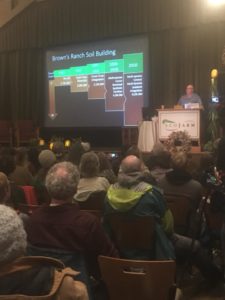By Elena Karoulina, Executive Director, Sustainable Solano
 At the end of January, I was honored to attend the 38th Eco Farm Conference at Asilomar Conference Grounds. It’s an annual convergence of farmers, supporting people and organizations dedicated to “ecological farming” – farming that works in harmony with nature, that seeks to heal and regenerate our land and water, and to provide wholesome, nurturing food to our communities. Sustainable Solano is beginning to work toward the vision of a healthy and whole local food system in the county, and we welcome this opportunity to learn from the field and bring this knowledge back to Solano County.
At the end of January, I was honored to attend the 38th Eco Farm Conference at Asilomar Conference Grounds. It’s an annual convergence of farmers, supporting people and organizations dedicated to “ecological farming” – farming that works in harmony with nature, that seeks to heal and regenerate our land and water, and to provide wholesome, nurturing food to our communities. Sustainable Solano is beginning to work toward the vision of a healthy and whole local food system in the county, and we welcome this opportunity to learn from the field and bring this knowledge back to Solano County.
Farm as a living organism, in harmony with nature and people, regenerating its own vitality and fertility on site
The central pole of the conference was sustainable agriculture – why, and most importantly, how. “Regenerating Our Soils” keynote opened the event, followed by many workshops on soil health and building soil fertility directly on the farm and not from the outside in the form of fertilizers, pesticides and herbicides. Healthy soil is the foundation of sustainable agriculture. Cover crop and crop rotation, incorporating animals into farming operations (manure has been the foundation of land’s fertility since humanity began farming 12,000 years ago), no-till approach, composting – all this and more was presented by experienced farmers and scientist now proving in their labs what has been known around the globe for centuries. This attention to soil health is reinforced by our recent realization that improving soil health can reduce greenhouse gas emission and sequester carbon!
Farming workshops included a wide range of topics on plants nutrition, selection, health and diseases; classes on specific crops, irrigation, tools and machinery, greenhouses, seeds and seed saving. Permaculture and biodynamic agriculture were examined through numerous workshops and gatherings. Urban agriculture was included too – an inspiring example from our neighbors in Richmond, Urban Tilth.
“People in communities like Richmond are treated only as consumers, meant to consume the products that others create to help them realize their dreams, and help us continue with our grind. They give just enough to continue, but no more.” Keynote speaker Doria Robinson, Urban Tilth, Richmond, CA.
The next big topic was how to get this wonderful harvest to local communities. Almost a dozen of workshops dedicated to delivery and logistics solutions, Community Supported Agriculture, small independent retails stores and food co-ops, working with restaurants, food safety, and utilizing social media.
And then came everything that surrounds farming: land use, social justice, legal and financial constraints and considerations, farmland protection and farmers’ succession, and food policies – from a Farm Bill to state policies to local laws and ordinances, including zoning. One of the big takeaways for me was the notion of how quickly we are loosing farmland to development, land hoarding and speculation. Representatives from the Sustainable Economies Law Center (our partners in the development of Solano Local Food System!), California FarmLink, California Center for Cooperative Development, various land trusts and legal firms discussed options for farmland protections and creative funding to remove farmland from speculative real estate market and protect it forever for agriculture. Traditional land trusts, emerging affirmative agricultural easements, community land trusts – these and other legal forms were examined at length.
There is no planet B.
Inspiring key speakers kept all of us attuned to the vital importance of this work and kept things in perspective by returning us to big picture. Winona LaDuke spoke beautifully about sacred land and practices of native people, new economy, environmental justice and a choice between a well-worn, scorched path and a new, green path ahead of us. Dr. John Ikerd masterfully outlined the devastation caused by industrial agriculture and promise of small farms and ecological farming to finally end hunger. John argued that healthy food is a fundamental human right, and since market economy failed our food system, local jurisdictions can declare basic food to be a utility and thus be provided to all people as basic services, just like water or energy.
After these three days of intense learning and networking, going from inspiration to despair and back to resolve to make a difference, we returned home ready to tackle the most important, fundamental and life-giving area of our lives – healthy local food for all.
Made possible by Solano Public Health in partnership with the Yocha Dehe Wintun Nation

